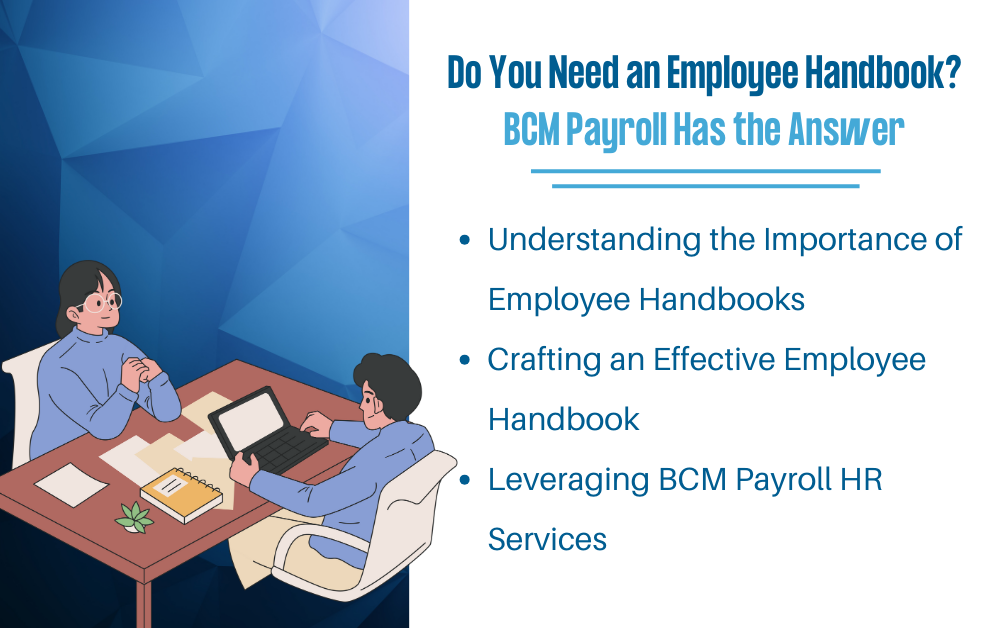Welcome to BCM Payroll’s guide on employee handbooks—a vital tool for businesses. They help establish clear guidelines, foster a positive work environment, and ensure legal compliance. In today’s dynamic workplace, the employee handbook plays a pivotal role in communicating expectations, outlining policies, and aligning employees with organizational goals. Explore the essentials of handbook development with us and learn how
BCM Payroll’s HR services ensure compliance and streamline the process. Let’s dive in to empower your business with a robust and tailored employee handbook.
Understanding the Importance of Employee Handbooks
Defining the Employee Handbook
Employee handbooks are more than just collections of policies and procedures; they are foundational documents that shape the employer-employee relationship. At BCMPayroll, we recognize the pivotal role that employee handbooks play in establishing clear guidelines, fostering a positive work culture, and ensuring legal compliance.
An employee handbook, often referred to as an employee manual or policy manual, serves as a comprehensive document. It outlines the expectations, rights, responsibilities, and benefits of both employees and the employer. This foundational document is essential for fostering clarity and mutual understanding in the workplace. It serves as a roadmap for navigating various aspects of the workplace, from day-to-day operations to disciplinary procedures.
Why Your Business Needs an Employee Handbook
In today’s dynamic business landscape, having a well-crafted employee handbook is essential for several reasons:
- Communicating Expectations: A clear and concise employee handbook provides employees with a thorough understanding of their job duties, performance expectations, conduct standards, and disciplinary procedures. By setting forth these expectations from the outset, businesses can foster a productive and harmonious work environment.
- Legal Compliance: Beyond establishing guidelines for employee behavior, an employee handbook serves as a crucial tool for ensuring compliance with state and federal employment laws. Businesses can mitigate legal risks by including relevant regulations, anti-discrimination policies, and safety guidelines in their employee handbooks. This demonstrates their commitment to upholding labor standards.
- Standardizing Practices: Employee handbooks help standardize HR practices across the organization, ensuring consistency in policies and procedures. This uniformity is particularly important for businesses with multiple locations or diverse workforce demographics, as it promotes fairness and equity in the treatment of employees.
- Setting Company Culture: Beyond its practical functions, an employee handbook also plays a significant role in shaping company culture. The handbook articulates the organization’s mission, values, and goals. This alignment fosters a sense of belonging and shared purpose among employees.
In summary, an employee handbook serves as a foundational document that not only communicates expectations and policies but also reinforces the company’s values and legal obligations. At BCMPayroll, we understand the importance of crafting comprehensive and compliant handbooks tailored to each client’s unique needs and circumstances. In the following section, we’ll explore the essential do’s and don’ts of creating an effective employee handbook.
Crafting an Effective Employee Handbook: The Do’s and Don’ts
Essential Do’s for Creating Your Handbook
Crafting an effective employee handbook requires careful consideration of various factors to ensure clarity, compliance, and alignment with the organization’s goals. Here are some essential do’s to keep in mind:
- Clearly Define Policies: One of the primary objectives of an employee handbook is to provide clarity on policies and procedures. Ensure that each policy is clearly articulated, with specific guidelines on employee conduct, behavior expectations, performance standards, attendance requirements, and disciplinary procedures. Clarity reduces ambiguity and promotes consistent application of policies across the organization.
- Tailor Policies to Your Business: Employee handbooks commonly include policies like anti-discrimination and code of conduct. However, it’s essential to customize your handbook to reflect your organization’s unique culture and values. Tailoring policies to your operational needs ensures relevance and effectiveness. Tailoring policies ensures that they resonate with employees and are relevant to the specific challenges and opportunities faced by your business.
- Seek Legal Review: To ensure compliance with relevant labor laws and regulations, it’s advisable to seek legal review of your employee handbook. A legal expert can help identify potential areas of non-compliance and provide guidance. They can assist in wording policies to minimize legal risks. Investing in legal review upfront can save your business from costly litigation down the line.
- Promote Accessibility: Make sure your employee handbook is easily accessible to all employees. Consider distributing it electronically via email or a company intranet, in addition to providing hard copies. Accessibility ensures that employees can reference the handbook whenever needed and stay informed about company policies and procedures.
Pitfalls to Avoid: The Don’ts of Handbook Creation
While creating an employee handbook, it’s equally important to avoid common pitfalls that can undermine its effectiveness and legality. Here are some key don’ts to steer clear of:
- One Size Doesn’t Fit All: Avoid using a generic employee handbook template without considering the specific needs and circumstances of your workforce. Different roles, departments, and locations may require different policies and procedures. Tailor your handbook to accommodate these variations and ensure relevance to all employees.
- Overload with Policies: While it’s crucial to cover essential policies, such as harassment prevention and safety guidelines, resist the temptation to include every possible scenario in your handbook. Overloading the handbook with excessive policies can overwhelm employees and dilute the effectiveness of critical information. Focus on essential policies that address the most common workplace issues, leaving room for flexibility in day-to-day operations.
- Neglect Regular Updates: Employee handbooks should evolve with changes in laws, regulations, and company policies. Neglecting to update your handbook regularly can lead to outdated information and potential legal liabilities. Establish a process for reviewing and updating the handbook at least annually, or as needed to reflect changes in the business environment.
By adhering to these do’s and don’ts, businesses can create employee handbooks that effectively communicate policies, promote compliance, and contribute to a positive workplace culture. In the next section, we’ll explore how BCMPayroll’s HR services can assist businesses in developing and maintaining compliant employee handbooks.
Leveraging BCM Payroll HR Services for Handbook Development and Compliance
BCM Payroll HR Resources: Your Partner in Compliance
At BCM Payroll, we understand the complexities involved in developing and maintaining compliant employee handbooks. That’s why we offer a range of HR resources designed to support businesses in navigating the intricacies of handbook development and compliance.
Our online HR resources provide round-the-clock access to updated policies, legal updates, and best practices to ensure compliance with evolving regulations. Whether you’re crafting a new employee handbook or updating an existing one, our resources provide essential tools and information. They help you make informed decisions and stay ahead of regulatory changes.
Crafting an employee handbook tailored to your business’s unique needs and legal requirements can be a daunting task. Our team of HR professionals is here to help. We offer customized handbook development services. We leverage our expertise to create policies and procedures that align with your company’s culture, values, and operational objectives. From drafting initial policies to conducting legal reviews, we’ll guide you through every step of the process, ensuring that your handbook reflects industry best practices and compliance standards.
Personalized HR Support: Upgrade to BCM Payroll’s Premium HR Services
In addition to our online HR resources, BCM Payroll offers premium HR services. These services provide direct access to experienced HR professionals. They can assist with handbook development, employee relations issues, and compliance challenges.
With our premium HR services, clients have the option to upgrade to phone and email support from our team of HR professionals. Whether you have questions about specific policies or need guidance on handling employee issues, our HR experts are here to help. They are just a phone call or email away, ready to assist with compliance matters. Receive personalized support tailored to your business’s needs, delivered promptly and professionally.
Our HR professionals bring years of experience and expertise to the table, enabling them to provide practical guidance and strategic advice on a wide range of HR issues. Whether you’re navigating complex legal requirements, addressing employee disputes, or developing HR policies, our team is here to help. Benefit from personalized guidance and support that empowers you to make informed decisions and effectively manage your workforce.
Conclusion:
In conclusion, employee handbooks are indispensable tools for businesses seeking to establish clear guidelines, foster a positive work culture, and ensure legal compliance. Employee handbooks define policies and communicate expectations. They also align employees with organizational goals, serving as the cornerstone of effective HR management. At BCM Payroll, we understand the importance of crafting comprehensive and compliant handbooks tailored to each client’s unique needs. Our HR services provide the expertise and support needed to develop, review, and maintain employee handbooks that reflect industry best practices and legal requirements. Empower your business with BCM Payroll. Ensure that your employee handbook stands as a beacon of clarity and compliance in today’s ever-changing workplace landscape.
Get Started with BCM Payroll: Craft Your Handbook Now!
Ready to enhance your HR management and ensure compliance with a comprehensive employee handbook? Contact BCM Payroll today to learn more about our HR services and how we can assist you in developing a tailored handbook for your business. Empower your workforce, mitigate legal risks, and streamline HR processes with BCM Payroll as your trusted partner. Reach out now and take the first step towards building a stronger, more compliant organization.

